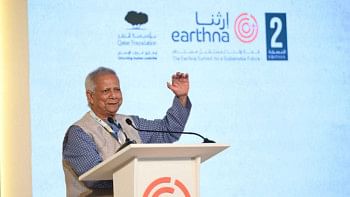Son defends accused Alim
Sazzad bin Alim, son of war crimes accused Abdul Alim, yesterday defended his father saying he was not involved in any crimes committed during the Liberation War in 1971.
Sazzad, third and last defence witness in the case, also testified at the International Crimes Tribunal-2 that Alim was involved with neither Peace Committee nor Razakar force in 1971.
Forty-eight-year-old Sazzad claimed his father had taken part in the Language Movement in 1952 and had to go to jail for that. Alim was a member of Joypurhat Sarbodaliya Sangram Parishad in 1971, he added.
During his three-hour testimony, Sazzad exhibited 23 pieces of documentary evidence including books, newspaper reports and certificates to defend his 83-year-old father.
Alim, a former BNP lawmaker, is facing 17 charges for his alleged involvement in the crimes against humanity and genocide committed in Joypurhat during the nine-month-long war.
After his testimony, prosecutor Rana Dasgupta started cross-examining the defence witness before the two-member tribunal of Justice Md Mozibur Rahman Miah and Justice Md Shahinur Islam adjourned the proceeding.
Sazzad is set to face further cross-examination today.
Sazzad, a businessman, said his father was born in India in 1930 and studied up to degree level in Kolkata. He later completed his master's in 1951 and LLB in 1953 from Dhaka University.
As a DU student, his father had taken part in the Language Movement and was behind bars for many days, claimed Sazzad.
“My father Abdul Alim is a Language Movement veteran.”
Sazzad, who was six in 1971, said they had lived in Bogra until March 1971 and gone to their own home in Joypurhat on March 29/30 after Pakistani army entered Bogra on March 27.
He claimed his father had gone into hiding after sending them to Aushgara, a village close to their home, on April 16/17. A few days later they had taken shelter at Musa Moulana's house in Hanail village.
His father had also taken shelter at that house, claimed Sazzad.
He said Pakistani army had first entered Joypurhat on April 24, but according to the prosecution, the date was April 20.
The prosecution said Alim had established an army camp, peace committee office and training centre for Razakars by occupying the trading office of Shaonlal Bajla in Joypurhat.
But Sazzad yesterday claimed his father had a good rapport with Shaonlal.
He also claimed his father was not involved with Peace Committee or Razakar force. He added no newspapers in 1971 published reports against his father.
Sazzad further said the Awami League government had appointed his father as the director of Joypurhat Sugar Mill in 1974.
But a defence petition, which said Alim was behind bars in 1974, contradicted Sazzad's claim.
The petition said in January 1974 Alim was arrested in an emergency order under the Security Act and was released on August 6, 1975.
Sazzad said his father was elected Joypurhat municipality chairman in 1975 and 1977, chairman of Joypurhat sadar upazila in 1985 and 1990, a parliament member in 1979, 1996 and 2001 from BNP and president of Joypurhat District Bar Association twice.
Alim became a member of president Ziaur Rahman's cabinet in 1978.
Meanwhile, the tribunal adjourned the case proceeding against Chowdhury Mueen Uddin and Ashrafuzzaman Khan until September 5 as the prosecution failed to produce their witnesses yesterday.

 For all latest news, follow The Daily Star's Google News channel.
For all latest news, follow The Daily Star's Google News channel. 



Comments